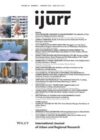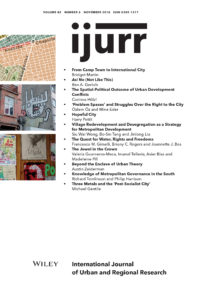Volume 42 Issue 6 November 2018
In This Issue...
Articles
The November issue of IJURR is riddled with tension: from resistance to military urbanisation in Pyeongtaek to protests against urban development projects in Mexico City and Santiago de Chile, from struggles over urban space in Istanbul to struggles to access water in the informal settlements of Delhi, Faridabad and Mumbai. We also see with examples from Guangzhou City, Cairo, Cardiff and Donostia that these tensions are in many ways a sign of the times, where established ways of life are dismantled by top-down urban transformation projects, legitimacy of local governments are undermined by austerity urbanism, rights of urban citizens are eroded by authoritarian forms of governance, and participation becomes a tool of governance and depoliticization rather than a means to effect change. Not all these transformations generate the same reactions; ambitious urban projects also induce hope, rather than generate outright opposition, though this hope may be much less emancipatory than it might seem. But let us not end on such a pessimistic note: these conflicts are also laboratories for learning and refining modes of public engagement, protest and transformative politics that prioritise the well-being of urban dwellers rather than the profits to be made from urban space.
Mustafa Dikeç
Three Interventions on Urban Knowledge
The November issue includes three provocative Interventions essays on the production and dissemination of urban knowledge. In the first of these, Austin Zeiderman challenges urban studies scholars to consider the material consequences of the theoretical concepts we use. Inspired by Stuart Hall’s classical work on ‘race’ as a floating signifier, Zeiderman argues that concepts like ‘urban’ and ‘global’ are articulating principles of our social formations. Drawing upon fieldwork in Buenaventura, Colombia, he demonstrates that these concepts have social, cultural and political lives of their own, with discursive and material effects in the world. The next essay, by Richard Tomlinson and Philip Harrison, demonstrates how concepts like these travel to and between cities and metropolitan regions in the global South. Noting the prevalence of phrases like ‘public private partnerships’, ‘new public management’, ‘metropolitan governance’ and ‘best practice’ in urban policy formations since the early 2000s, Tomlinson and Harrison document the participation of policy professionals, political leaders and private actors in what they call transnational municipal networks, demonstrating the centrality of these networks in the development, diffusion and application of urban policy knowledge. In the third essay, Michael Gentile points out the relatively small number of ‘Western’ cities on which most urban knowledge is based. Among the causes for this narrowness, Gentile posits that concepts like ‘post-Socialist’ erect boundaries that push scholars of these cities to the peripheries of urban knowledge. Arguing that this concept opposes the (imagined) normality of the Western cities and the (imagined) marginal experiences of cities in Eastern Europe and Kazakhstan, he suggests that scholars would be better off dropping post-Socialist definitions altogether when researching Kazakhstan, Prague, Tashkent and other urban places under formerly Moscow control. Together, these three important essays encourage us to rethink the scholarly concepts we use, including their source, their pathways of dissemination, and their effects in the world.
Liza Weinstein
Articles
From Camp Town to International City: Us Military Base Expansion and Local Development in Pyeongtaek, South Korea
Published online on Nov 9th, 2018 | DOI: 10.1111/1468-2427.12698 (p 967-985)
Así No (Not Like This): Resisting Postpolitics on Mexico City’s Avenida Chapultepec
Published online on Oct 26th, 2018 | DOI: 10.1111/1468-2427.12659 (p 986-1007)
The Spatial‐Political Outcome of Urban Development Conflicts: Emancipatory Dynamics of Protests against Gentrification in Peñalolén, Santiago de Chile
Published online on Oct 12th, 2018 | DOI: 10.1111/1468-2427.12674 (p 1008-1029)
‘Problem Spaces’ and Struggles Over the Right to the City: Challenges of Living Differentially in a Gentrifying Istanbul Neighborhood
Published online on Aug 10th, 2018 | DOI: 10.1111/1468-2427.12656 (p 1030-1047)
Hopeful City: Meritocracy and Affect in Global Cairo
Published online on Sep 26th, 2018 | DOI: 10.1111/1468-2427.12695 (p 1048-1063)
Village Redevelopment and Desegregation as a Strategy for Metropolitan Development: Some Lessons from Guangzhou City
Published online on Aug 6th, 2018 | DOI: 10.1111/1468-2427.12633 (p 1064-1079)
The Quest for Water, Rights and Freedoms: Informal Urban Settlements in India
Published online on Oct 23rd, 2018 | DOI: 10.1111/1468-2427.12708 (p 1080-1095)
The Jewel in the Crown: Co‐optive Capacity and Participation During Austerity in Cardiff and San Sebastián‐Donostia
Published online on Nov 2nd, 2018 | DOI: https://doi.org/10.1111/1468-2427.12709 (p 1096-1113)
Interventions
Beyond the Enclave of Urban Theory
Published online on Sep 26th, 2018 | DOI: 10.1111/1468-2427.12661 (p 1114-1126)
Knowledge of Metropolitan Governance in the South
Published online on Aug 30th, 2018 | DOI: 10.1111/1468-2427.12658 (p 1127-1139)
Three Metals and the ‘Post-Socialist City’: Reclaiming the Peripheries of Urban Knowledge
Published online on Feb 16th, 2018 | DOI: 10.1111/1468-2427.12552 (p 1140-1151)
Book Reviews
Derek Hyra 2017: Race, Class, and Politics in the Cappuccino City. Chicago: University of Chicago Press
Published online on Nov 9th, 2018 | DOI: 10.1111/1468-2427.12716 (p 1152-1153)
Stavros Stavrides 2016: Common Space: The City as Commons. London: Zed Books
Published online on Nov 9th, 2018 | DOI: 10.1111/1468-2427.12717 (p 1153-1155)
John J. Betancur and Janet L. Smith 2016: Claiming Neighborhood: New Ways of Understanding Urban Change. Urbana: University of Illinois Press
Published online on Nov 9th, 2018 | DOI: 10.1111/1468-2427.12718 (p 1155-1156)
Justin B. Hollander 2018: A Research Agenda for Shrinking Cities. Cheltenham: Edward Elgar Publishing
Published online on Nov 9th, 2018 | DOI: 10.1111/1468-2427.12719 (p 1156-1158)
Alan Mayne 2017: Slums: The History of a Global Injustice. London: Reaktion Books Ltd
Published online on Nov 9th, 2018 | DOI: 10.1111/1468-2427.12720 (p 1158-1159)
Gavin Shatkin 2017: Cities for Profit: The Real Estate Turn in Asia’s Urban Politics. Ithaca, NY: Cornell University Press
Published online on Nov 9th, 2018 | DOI: 10.1111/1468-2427.12721 (p 1159-1160)
Luna Khirfan (ed.) 2017: Order and Disorder: Urban Governance and the Making of Middle Eastern Cities. Montreal: McGill‐Queen’s University Press
Published online on Nov 9th, 2018 | DOI: 10.1111/1468-2427.12722 (p 1160-1162)
Scott McQuire 2017: Geomedia: Networked Cities and the Future of Public Space. Cambridge: Polity
Published online on Nov 9th, 2018 | DOI: 10.1111/1468-2427.12723 (p 1162-1164)
Issues in this volume
January 2018
March 2018
May 2018
July 2018
September 2018
November 2018

